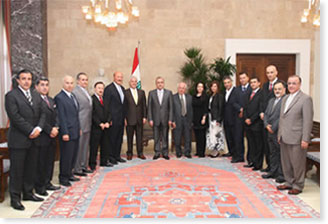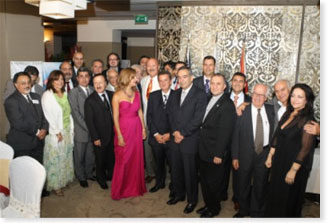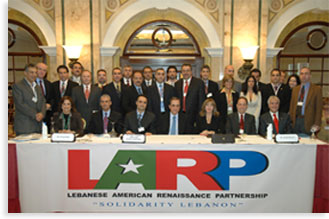Remarks by Jeffrey D. Feltman, U.S. Ambassador to Lebanon
Gala Dinner, Beirut, Lebanon - Friday, November 10, 2006
 It’s real pleasure to welcome this large group pf Americans to Lebanon. I spent a lot of time this summer saying good bye to Americans – more than 15000 of them in fact – and so it really is wonderful to welcome you, the members of the Lebanese American Renaissance Partnership, to Lebanon today.
It’s real pleasure to welcome this large group pf Americans to Lebanon. I spent a lot of time this summer saying good bye to Americans – more than 15000 of them in fact – and so it really is wonderful to welcome you, the members of the Lebanese American Renaissance Partnership, to Lebanon today.
Let me tell you what I observed when I said good bye to many of the Americans who chose to return to the United States in July when the violence marred their summer plans. I said good-bye to young couples who’d brought their children to visit grandparents, aunts and uncles and cousins. I said good-bye to college students who, curious about the culture of their ancestors, came to study Arabic. I said good-bye to men and women who, having already achieved financial success in the United States, returned to contribute to their communities here. I said good-bye to newly wed who’d hoped to spend their honeymoon with extended families who’d come to celebrate the weddings of relatives in Lebanon. I said good bye to teenagers who looked like they’d walked out of an American shopping mall and grandparents who dressed as if the never left their Lebanese villages.
Representing the full diversity of Lebanon, each one of them had two things in common: their American passport and a deep commitment to Lebanon. Their presence in Lebanon this summer – like your own presence here today – highlights what all of us at the Embassy know well: That the real foundation of the U.S. – Lebanese relationship is the success of the American-Lebanese and their continued ties with Lebanon.
Let me tell you – I much prefer welcoming Americans than saying good-bye. So thank you to all of you for your willingness to travel to Lebanon now to assess how you can help the Lebanese people rebuild after this summer’s tragic events.
The Lebanese American Renaissance Partnership is the third group of American private sector leaders I‘ve had the privilege of welcoming to Lebanon since the conflict ended. President Bush asked four CEOs to travel to Lebanon in September to identify ways in which the U.S. private sector could partner with Lebanese communities to rebuild the country. In a follow-up meeting with President Bush, the delegation announced the creation of the U.S. – Lebanon Partnership Fund to provide resources to assist in the reconstruction efforts in Lebanon. Last month, I welcomed also the Arab-American Chamber of Commerce. These visits are the tangible proof that a strong partnership exists between the Lebanese and American people and that the future of our two diverse and democratic countries are inextricably linked. And it is this partnership, which can help Lebanon overcome what was truly a terrible summer, the full implications of which are not known.
As some of you know, I have just returned from a visit to the United States, which included consultation in Washington. I heard inspiring testimony from across the political spectrum of the strong commitment of the United States to Lebanon’s independence and a recognition that it is not enough to support Lebanon’s survival – we must also work collectively to ensure Lebanon’s economic and democratic revival.
In committing more than $230 million to assist with Lebanon’s recovery, President Bush was very clear. He said:” America is making a long-term commitment to help the people of Lebanon because we believe every person deserves to live in a free, open society that respects the rights of all.”
Two weeks ago, U.S. Deputy Secretary of State for Foreign assistance Randall Tobias - who is also the Administrator for USAID and thus the boss of our friend Walid Maalouf – spent two days in Lebanon to verify that the pledge made by the United States was being translated into action on the ground and that America’s commitment to the Lebanese people was more than just numbers. I was proud of what we had to show Ambassador Tobias. In Byblos, the United States, in partnership with the Government of Lebanon, is working to clean up the oil spill and improve the livelihoods of the communities who live there. At the Mudairej Bridge, Ambassador Tobias announced America’s commitment to rebuild this vital commercial link between Beirut and Chtoura to help stimulate trade and economic growth essential for Lebanon’s financial recovery.
Elsewhere in the country, Ambassador Tobias met local farmers using an agricultural center, we helped fund, to improve their products and market them not only locally in Lebanon, but globally. With assistance from the United States, these farmers have an opportunity to compete in a marketplace inaccessible not too long ago. Ambassador Tobias visited beneficiaries of a U.S. – funded micro finance program aimed at helping Lebanese entrepreneurs realize their economic aspiration. These programs, in partnership with Lebanese organizations, expand economic opportunities in a way that is sustainable and supportive of the entrepreneurial spirit of the Lebanese people.
Let me offer you one of the statistics to illustrate why U.S. assistance now is more important than ever. In June, when the Lebanese were anticipating their most successful tourism summer ever, GDP was estimated to be growing at six percent annually. Now, that growth has vanished, and, while Lebanese officials are hoping to achieve zero percent growth, some estimates indicate as much as a five percent decline. This swing – up to 11 percent on the wrong direction – requires all of us to focus not just on Lebanon’s survival, which was not really in question, but also Lebanon’s revival.
I am proud that U.S. assistance plays a role in improving the lives of the Lebanese people. Each on of you here today makes this assistance possible. Our projects are carried out in partnership with the Lebanese people but the funding is a gift from the American people. What we do here on the ground reflects the generosity and compassion of the American people.
But there is also another way in which the United States supports Lebanon – support that it would be hard to quantify with a dollar figure. Through our leadership on the United Nations Security Council, our alliances in Europe and elsewhere in the world and with our close relations with moderates throughout the Arab world, the United States has advocated loudly and acted forcefully on behalf of Lebanese sovereignty and independence. I assure you, too, that Washington has emphasized to Lebanon’s southern neighbor the importance of not undermining international efforts to support Lebanon. We’ve also put our muscle behind the formation of an independent international investigation commission to make sure that those who are responsible in the murder of Rafik Hariri are brought to justice. And working with our Security Council partners we’ve acted to help untangle the web of political killings carried out during the past two years.
I am proud of what the United States is doing to help Lebanon. Each one of you here has much to offer as well – and much remains to be done. As you look for ways in which you can lend your talents and energies to support Lebanon, you can be certain that the commitment of the United States to Lebanon will remain firm, enduring and non-negotiable. Working in partnership with the Government of Lebanon, the United States will work with Lebanon toward a peaceful and prosperous Lebanon with opportunities for all its citizens.
Thank you and enjoy your stay in Lebanon.






